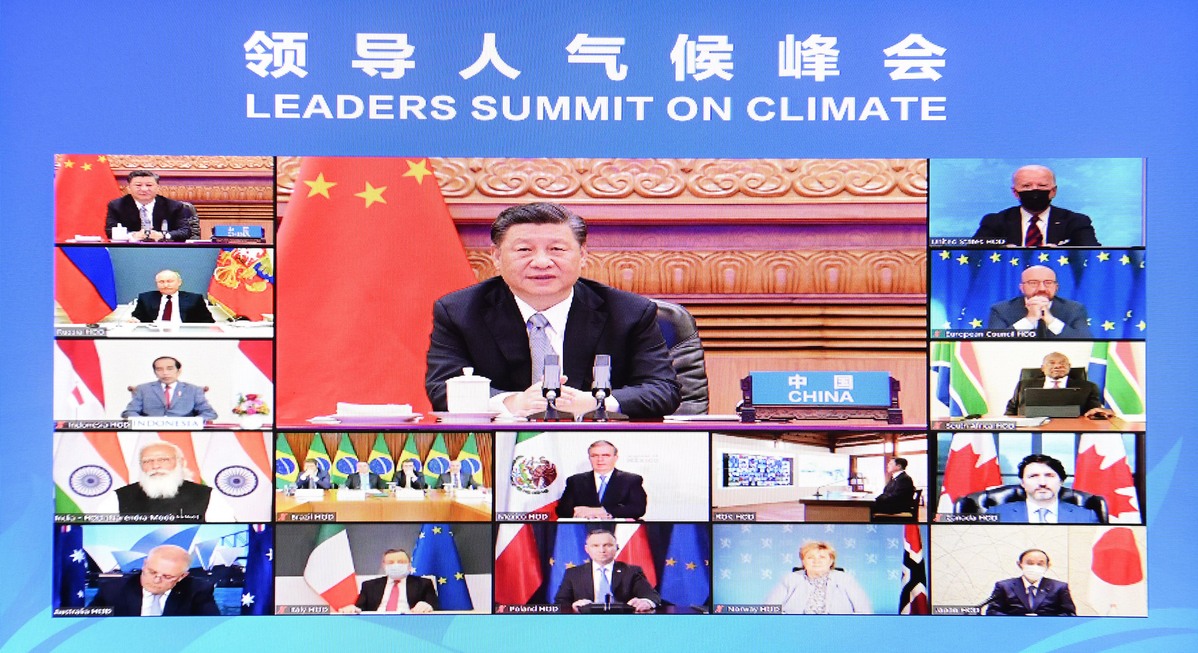Xi's climate speech wins global acclaim
President pledges firm measures to reach carbon neutrality goal by 2060






President Xi Jinping's speech on Thursday at the Leaders Summit on Climate, where he set out China's ambitious pledges, has won praise from world leaders and experts.
In the speech, Xi talked about how man and nature should build a community of life together and vowed the country will take aggressive measures to reach carbon neutrality by 2060, including to begin phasing out coal.
"I think what President Xi had to say about the harmony with nature was absolutely vital," British Prime Minister Boris Johnson said in a speech shortly after Xi's.
"If we're going to tackle climate change sustainably, we have to deal with the disaster of habitat loss and species loss across our planet and we want to see even more examples of government and private industry working hand in hand as with the newly launched LEAF Coalition to reduce deforestation and the multitrillion dollar Glasgow Financial Alliance for Net Zero," said Johnson, referring to global initiatives to protect tropical forests and speed up net zero transition.
The United Kingdom will host COP26 in Glasgow in November while China will host the UN Biodiversity Conference in October.
In his speech, Gaston Browne, prime minister of Antigua and Barbuda, praised China and the US for their pledges at the virtual meeting, which was hosted by the US and drew 40 world leaders.
"We are grateful that the United States and China have pledged to reduce their greenhouse gas emissions and we look forward to swift action in their transitioning into carbon neutral economies," Browne said.
Nicholas Stern, chair of the Grantham Research Institute on Climate Change and the Environment at the London School of Economics and Political Science, said that Xi repeated China's commitment to peak its carbon dioxide emissions by 2030 and to achieve carbon neutrality by 2060, but also added for the first time that China will strictly limit the increase in coal consumption during the period of the 14th Five-Year Plan (2021-25) and will phase down coal during the 15th Five-Year Plan (2026-30).
"This suggests that China could reach its peak emissions by 2025, or soon after, which would be a significant advance in ambition," said Stern, a British economist.
Hege Fjellheim, head of Norway-based Carbon Research at Refinitiv, said that Xi's speech "adds to the positive momentum for global climate change mitigation in the year of COP26".
"The reference to some regions and sectors to peak emissions earlier could hint towards an aim of China achieving carbon peak ahead of 2030," Fjellheim said.
Anri Sharapov, a professor at the Tashkent State University of Oriental Studies in Uzbekistan, said that Xi's speech demonstrated that China is always an active participant in facing global climate change.
"As a major power with responsibility, Xi's remarks showed the world the determination by China to protect the environment and solve climate change problems, which will definitely increase the confidence of the international community to jointly face the challenges of climate change," Sharapov said.
Hiroshi Onishi, an economics professor at Keio University in Tokyo, said it is of crucial significance to see that China and the US work together to tackle climate change.
"By doing so, it sends a clear signal to the world that we do need to worry about climate change and sometimes take harsh measures to fix it," Onishi said.
Serik Korzhumbayev, editor-in-chief of the newspaper Delovoy Kazakhstan, said that it was remarkable that in the recent years China was following the new development philosophy and adhering to the path of green and low-carbon development.
Kelly Gallagher, professor of energy and environment at The Fletcher School of Tufts University based in Massachusetts, US, said Xi "essentially confirms that China will stay the course, continuing to reduce coal as a percentage of primary energy through 2030".
She noted that China's newly added capacity in renewables dwarfs its newly added coal capacity.
"China's added capacity in renewables in 2020 was almost twice as large as US added capacity," she said on social media on Thursday.
Xi's vision of a community with a shared future for mankind has climate action at its core. But the building of this common future must also be a shared responsibility, by all countries and all sectors, to keep the global temperature rise to below 1.5 degrees, said Renato Redentor Constantino, executive director of the Institute for Climate and Sustainable Cities.
When it comes to issues such as climate change and COVID-19, more attention should be paid to the voice of less developed countries, says Rana Mitter, professor of the history and politics of modern China at University of Oxford.
"There are a wide range of areas where global discussion across national boundaries is urgent, and the climate crisis and dealing with COVID are the two major ones," he said after the opening of the Boao Forum for Asia annual meeting on Tuesday. "It's important to note that the voice of the Global South needs to be heard more clearly; bringing in the voices of sub-Saharan Africa, Latin America and Southeast Asia is crucial, as they are newer voices that have not yet been sufficiently heard in global society."
Asher Minns, executive director of the Tyndall Centre for Climate Change Research at the University of East Anglia in the United Kingdom, also stressed the importance of cooperation in fighting climate change. "China working with the United States and both embracing international multilateral collaboration suggests not only that the peak of global carbon emissions is genuinely in sight for the first time ever; it may even be that a spill-over or co-benefit of avoiding dangerous climate change genuinely contributes to world peace through nations united against climate change."
Wang Xu in Tokyo, Bo Leung in London, and Prime Sarmiento in Hong Kong contributed to this story.
- PLA carries out drone training operations near Dongsha Islands
- PLA monitors US naval vessels transiting the Taiwan Strait
- Losar warmth in a new home
- New carrier rocket built by Beijing company fails in maiden flight
- Toxic gas leak in Anhui classified as major work safety liability accident
- Xiamen Marathon runners banned for smoking on course
































